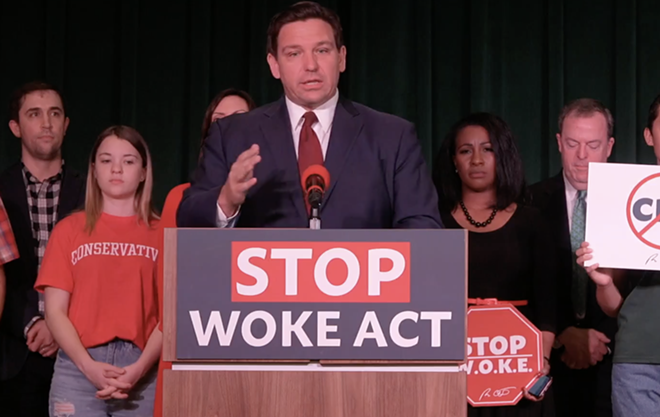Florida could face paying nearly $750,000 in legal fees for businesses that successfully challenged part of a 2022 law that Gov. Ron DeSantis dubbed the “Stop WOKE Act.”
Citing what they called a “resounding victory,” attorneys for the businesses filed a motion Friday seeking $749,642 in fees. Also, they sought $41,144 in additional costs related to the lengthy legal battle.
Chief U.S. District Judge Mark Walker in August ruled that the plaintiffs were entitled to seek fees, clearing the way for Friday’s detailed motion. The state faces an Oct. 28 deadline to respond to the request.
The underlying case involved a challenge to part of the state law that placed restrictions on addressing race-related issues in workplace training. Walker in 2022 issued a preliminary injunction against the restrictions on free-speech grounds. A panel of the 11th U.S. Circuit Court of Appeals in March upheld the preliminary injunction, and Walker followed in July by issuing a permanent injunction.
“It is hard to envision greater success than what plaintiffs attained in this case,” Friday’s motion for fees said. “This court’s opinion, and the Eleventh Circuit’s opinion affirming the same, now stand as important constitutional markers for courts across the United States. Plaintiffs, in turn, have been able to continue their diversity trainings both as employers and trainers without fear of government encroachment on their free speech, which is exactly what they had wanted.”
Attorneys from the international law firm Ropes & Gray LLP and the non-profit group Protect Democracy represented the plaintiffs — Primo Tampa, LLC, a Ben & Jerry’s ice-cream franchisee; Honeyfund.com, Inc., a Clearwater-based technology company that provides wedding registries; and Chevara Orrin and her company, Collective Concepts, LLC. Orrin and her company provide consulting and training to employers about issues such as diversity, equity and inclusion.
The motion seeks $458,676 in legal fees and $32,128 in costs for Roper & Gray and $290,966 in legal fees and $2,641 in costs for Protect Democracy. It also seeks $6,375 in expert fees.
It details requested attorney fees ranging from $200 an hour to $775 an hour and said the rates were reduced to reflect the “prevailing market rates” in the federal Northern District of Florida, where the case was filed. Lower fees were requested for the work of people such as paralegals.
To try to bolster their request, the plaintiffs’ attorneys pointed to what the state paid the Washington, D.C.-based Cooper & Kirk firm to represent it in the case. Citing state data, the plaintiffs’ attorneys said the state paid a “blended rate” of $725 an hour for each Cooper & Kirk lawyer who worked on the case.
The Stop WOKE Act — short for what DeSantis called the “Stop Wrongs To Our Kids and Employees Act” — drew fierce debate in 2022 before being approved by the Republican-controlled Legislature. Part of the law put restrictions on workplace training, while another part included restrictions for the education system.
The workplace-training part listed eight race-related concepts and said that a required training program or other activity that “espouses, promotes, advances, inculcates, or compels such individual (an employee) to believe any of the following concepts constitutes discrimination based on race, color, sex, or national origin.”
As an example of the concepts, the law targeted compelling employees to believe that an “individual, by virtue of his or her race, color, sex, or national origin, bears personal responsibility for and must feel guilt, anguish, or other forms of psychological distress because of actions, in which the individual played no part, committed in the past by other members of the same race, color, sex, or national origin.”
In court documents, the state disputed that the law violated speech rights, saying that it regulated “conduct.” It said businesses could still address the targeted concepts in workplace training — but couldn’t force employees to take part.
But, for example, the appeals court described the law as the “latest attempt to control speech by recharacterizing it as conduct. Florida may be exactly right about the nature of the ideas it targets. Or it may not. Either way, the merits of these views will be decided in the clanging marketplace of ideas rather than a codebook or a courtroom.”
Walker also separately issued a preliminary injunction against the law’s restrictions on the way race-related concepts can be taught in universities. A panel of the appeals court held a hearing in that case in June but has not issued a ruling.
Subscribe to Creative Loafing newsletters.
Follow us: Google News | NewsBreak | Reddit | Instagram | Facebook | Twitter


